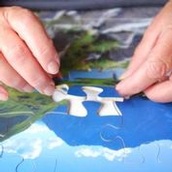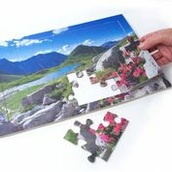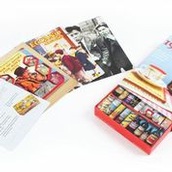Dementia design company working to make patronising children's activities in care homes a thing of the past
 A UK based company is improving the way people think about dementia activities by putting the person with dementia at the heart of its design process to create fulfilling and stimulating activities.
A UK based company is improving the way people think about dementia activities by putting the person with dementia at the heart of its design process to create fulfilling and stimulating activities.
The activities designed and created by Active Minds are designed with an older user in mind after the company’s founder discovered a lack of age appropriate activities for people with dementia. Founder of Active Minds, Ben Atkinson-Willes wanted to move away from patronising children’s colouring books and games to create sophisticated activities which engages with people with dementia.
Among their bestsellers include themed painting projects, jigsaw puzzles and 1940s and 1950s themed reminiscence cards.
The move to create activities for older people has become a key part of improving life for people living with dementia. There are a range of companies developing new ways to ensure people with dementia feel fulfilled and are stimulated through these carefully designed products.
Other activities include memory boxes, aqua paint resources and historical scrapbooks.
Getting started
Active Minds founder Ben Atkinson-Willes started developing activities for people with dementia after spending time with his grandfather living with dementia and being driven to improve the way activities are designed to increase user understanding and accessibility.

Mr Atkinson-Willes said: “While spending time with my grandfather (who was diagnosed with Alzheimer’s when Ben was 10 years of age) I noticed that he often didn’t know how to start an activity but if I’d help him to start it, the remaining cognitive links in his memory chain would return and he’d be able to do the rest by himself.
“This was highlighted to me when it came to him cleaning his teeth. Initially he would look blankly at the toothbrush with no idea what to do, however, once I had put the toothpaste on it and put the brush in his mouth to initiate the first few brushes, you could see the light bulb come on and he’d finish cleaning his teeth himself.” During the research period it was found that many people with dementia were able to complete a task if guided through the first steps.
Speaking at the annual Care Show in Bournemouth last month, Mr Atkinson-Wiles described the experience of an Australian man who was diagnosed with dementia who would not know how to do the washing up, even though he had carried out the daily role throughout his life. One day his wife filled the bowl up with water which triggered a memory in his mind and caused the man to understand the activity he was doing.
It was while studying product design at university that Mr Atkinson-Willes was able to use his research and knowledge to design a dementia friendly activity, and Active Mind’s first jigsaw puzzle was created.
When he was designing his first product, Mr Atkinson-Willes took inspiration from the positive impact prompts have by filling in a person’s missing links with activities.
The jigsaw puzzle’s first four pieces have already been completed and there is a border for people with dementia to use as a starting block.
One user reflected on the positive experience had by users.
Ann Dearing, whose mum has dementia, said: "My mum loves the puzzles; she used to love doing jigsaw puzzles before she got dementia and became increasingly frustrated at not being able to do any of the things she used to do. Doing your puzzles has helped her overcome some of that frustration and often helps to calm her when she is agitated. They are a good way to engage with her during family visits."
Authentic design
Other products sold by Active Minds include memory cards that have been designed to look and feel appealing to older people. The cards have pictures of familiar objects, places and situations from either the 1940s or 1950s to aid someone to talk about their own personal memories connected to these universal images.

Generic pictures from the time period as used after it was found pictures from someone’s personal collection could be distressing if they could not remember or connect with the particular experience.
After the movement of a book was found to feel potentially threatening to users of early prototypes, a cigarette-style box was designed and trialed. However the negative connotations associated with cigarettes caused designers to change its look. The easy to open matchbox style design has been taken forward and has been universally popular for carers and those with dementia.
Mr Atkinson-Willes said: “The design mantra is ‘Empathise, Define, Ideate, Prototype, Test’.” That for me is the key to knowing which prompts will help to enhance a person’s well-being, independence and sense of achievement. And I think that applies both to a product’s design development and to figuring out which prompts work best in someone’s daily care routines.
“I used my own skills as a product designer and asked myself some key questions: What images would help to invoke memories and could someone living with dementia complete a puzzle unaided?”
Another user of the cards described the benefits she had noted in people with dementia using the cards to trigger conversation and prompts.
Heather Johnson, said: “It's not easy to describe how much enjoyment people get from reminiscing with the cards, nor how surprised they are by this. I think it's because the subjects and stories are so authentic and the memories are happy. Once someone’s long-term memory is switched back on in such a positive way, they're off – and just don't want to stop.”
For more information about Active Minds please visit: http://www.active-minds.co.uk/
Latest Innovative Care News
 13-May-19
'Pink drink' brain cancer treatment rolled out across NHS in memory of Baroness Jowell
13-May-19
'Pink drink' brain cancer treatment rolled out across NHS in memory of Baroness Jowell
 25-Apr-19
Louis Tomlinson helps 83-year-old who lost wife to dementia complete bucket list
25-Apr-19
Louis Tomlinson helps 83-year-old who lost wife to dementia complete bucket list
 05-Mar-19
Care worker of the year inspires nine-year-old son to work in care
05-Mar-19
Care worker of the year inspires nine-year-old son to work in care
 12-Feb-19
Michael McIntyre's jokes tested to see if they stop elderly catching flu
12-Feb-19
Michael McIntyre's jokes tested to see if they stop elderly catching flu
 25-Jan-19
Ninety-year-old and his dog can stay together, thanks to care worker
25-Jan-19
Ninety-year-old and his dog can stay together, thanks to care worker